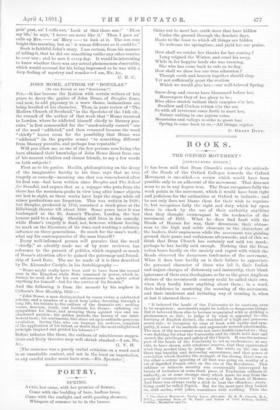JOHN HOME, AUTHOR OF "DOUGLAS."
in THE EDITOR ON THU " $PECTATOR." _I Sin,—It has become the fashion with certain writers of late years to decry the genius of John Home, of Douglas fame, and now, to add piquancy to a worn theme, insinuations are being levelled at his character. Thus, in your review of "The Modern Church of Scotland," in the Spectator of the 14th ult„ the remark of the author of that work that "Home removed to London, where he addicted himself chiefly to literary pur- suits," is first commended for the "academically correct" use of the word "addicted," and then censured because the word "chiefly" leaves room for the possibility that Home was " addicted " (in the popular sense) "to something different from literary pursuits, and perhaps less reputable."
Will you allow me, as one of the few persons now living who have obtained their knowledge of John Home direct from one of his nearest relatives and closest friends, to say a few words on both subjects P First as to his genius. Hazlitt, philosophising on the decay of the imaginative faculty in his time, says that no true tragedy or comedy—meaning one that was remembered after its first run—had been written since Douglas and The School for Scandal, and argues that as a voyager who puts from the shore has the mountain-peaks in view long after lesser objects are lost to sight, so these works have kept the stage while all minor productions are forgotten. This was written in 1820; but Douglas, produced in 1750, remained a stock-piece at the Edinburgh theatre till about 1840. Some years later it was burlesqued at the St. James's Theatre, London, the last honour paid to a classi,p. Sheridan still lives in his comedy, while Home's tragedy is dead, not, however, without leaving its mark on the literature of its time,•and working a salutary influence on three generations. So much for the man's work ; what say his contemporaries of the man himself Every well-infonmed person will perceive that the word "chiefly," so adroitly made use of by your reviewer, has reference to the pursuit of politics, which engaged so much of Home's attention after be gained the patronage and friend- ship of Lord Bute. The use he made of it is thus described by Dr. Alexander Carlyle, in his Autobiography :— " Home might really have been said to have boon the second man in the Kingdom while Bute remained in power, which in- fluence he used, not for his own advancement—he never asked anything for himself—but for the service of his friends."
And the following is from the memoir by his nephew in Colbwrn's New Monthly, 1839 :—
" John Home, a man distinguished by every virtue, a celebrated scholar, and a member of a most holy order, devoting, through a long life, his talents to the culture of the dramatic art : making virtue, heroism, truth, and fortitude his theme ; enlisting our sympathies for these, and arraying them against vice and un- chastened passion ; his golden periods, the luxury of our intel- lectual taste ; his sentiments, like stars set up to enkindle generous emulation. Seeing this, who can impugn his motives, complain of the application of his talent, or doubt that the most enlightened principle inspired and guided his labours p"






































 Previous page
Previous page